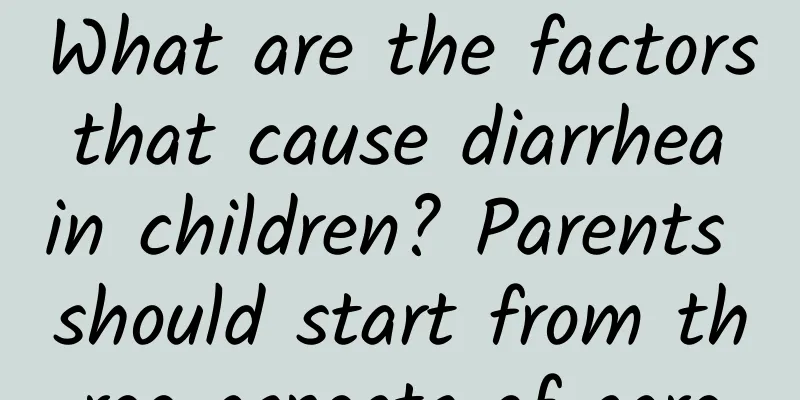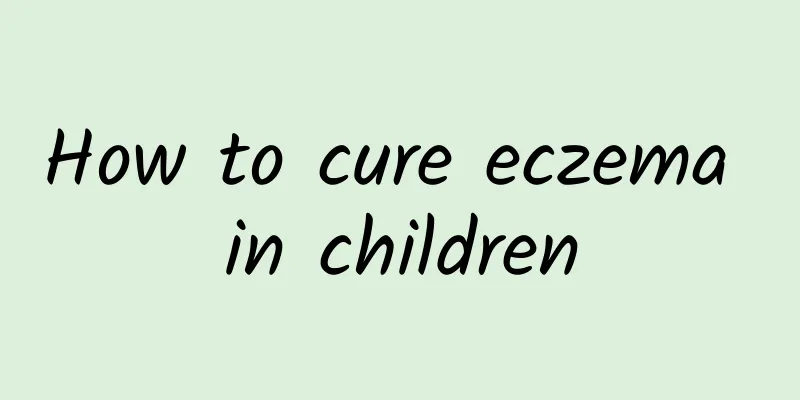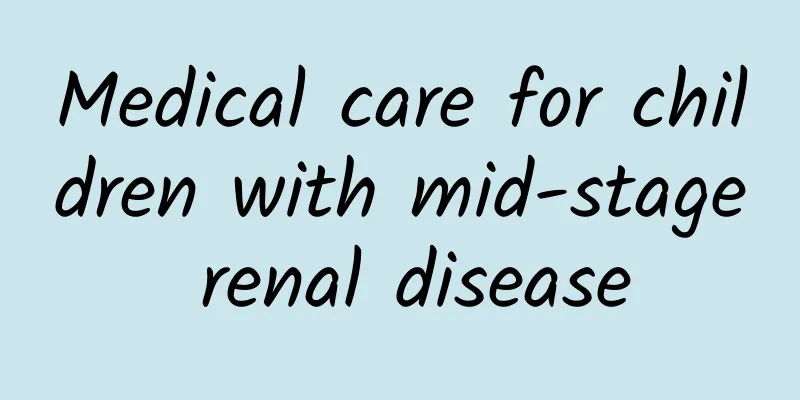What are the factors that cause diarrhea in children? Parents should start from three aspects of care

|
Diarrhea is very common among many children, especially in hot seasons like summer. Some children do not pay attention to their meals and are prone to diarrhea once they eat unhygienic food. So do you know what are the three factors that cause diarrhea in children? Three factors that cause diarrhea in children (1) Infection in the digestive tract: Pathogenic microorganisms can enter the digestive tract of children through contaminated food or water, and are therefore prone to occur in artificially fed children. If the utensils or food used for feeding are not disinfected or are not disinfected enough, infection is also possible. Viruses can also be transmitted through the respiratory tract or water sources. The second is infection by adult carriers of bacteria (viruses). For example, after an outbreak of bacterial (or viral) enteritis in a ward, some medical staff are infected and become asymptomatic intestinal carriers of bacteria (viruses), which can lead to the spread of pathogens. (2) Extra-digestive tract infection: Infection of organs and tissues outside the digestive tract can also cause diarrhea, which is common in otitis media, pharyngitis, pneumonia, urinary tract infection and skin infection. Diarrhea is usually not serious and is more common in younger people. The cause of diarrhea is partly due to extra-intestinal infection causing digestive dysfunction, and partly due to infection of the same pathogen (mainly viruses) inside and outside the intestine. (3) Intestinal flora disturbance caused by abuse of antibiotics: Long-term and large-scale use of broad-spectrum antibiotics such as chloramphenicol, kanamycin, gentamicin, ampicillin, and various cephalosporins, especially when two or more are used together, can directly stimulate the intestines or stimulate the autonomic nerves to cause increased intestinal motility, reduced glucose absorption, and reduced disaccharidase activity, resulting in diarrhea. More seriously, it can cause intestinal flora disturbance. At this time, normal intestinal Escherichia coli disappears or significantly decreases, and drug-resistant Staphylococcus aureus, Proteus, Pseudomonas aeruginosa, Clostridium difficile, or Candida albicans can multiply in large numbers, causing enteritis that is difficult to control with drugs. What are the types of diarrhea in children? (I) Physiological diarrhea Some babies have yellow-green loose stools soon after birth, and they have frequent bowel movements, but they are in good spirits, do not vomit, and have a good appetite. As they grow older, the diarrhea disappears naturally after adding complementary foods. Children with physiological diarrhea are prone to skin eczema and fever after taking foreign proteins such as milk or eggs, or even after being exposed to the sun, wind, or friction from clothes. (ii) Indigestion diarrhea. The most common cause of diarrhea in infancy is improper feeding, either eating too much or too little; hot weather, sudden cold; frequent changes in food, etc., which can all cause diarrhea due to indigestion. Indigestion diarrhea has symptoms such as fever, vomiting, and loss of appetite. The stool is thin and mushy, egg drop soup-like or watery, and even contains mucus. (III) Infectious diarrhea. Diarrhea caused by bacteria, viruses or fungi invading the gastrointestinal tract is called infectious diarrhea. Most children with this type of diarrhea have fever, and vomiting is not necessarily the main symptom. The stool has an abnormal odor and contains mucus or pus and blood. If not treated in time, the diarrhea will persist or worsen. How to properly care for babies with diarrhea 1. Diet care Breastfeeding mothers do not need to stop breastfeeding. For bottle feeding, mothers can dilute the milk, boil it, and skim off the oil on the surface. In addition, milk powder can be replaced with anti-allergic milk powder (soy milk powder, lactose-free milk powder, amino acid formula hydrolyzed protein milk powder). If adding complementary foods, cod liver oil should be stopped, vegetables should not be eaten, and carbohydrate complementary foods such as rice noodles and porridge should not be added with oil. Eating some applesauce or apple juice will help stop diarrhea. Add a small amount of glucose to the food to replenish the lost nutrients. In addition, if you are breastfeeding, the mother's diet will also affect the baby, so the mother should avoid eating irritating and very greasy foods. 2. Pay attention to hygiene Wash your hands before making milk and before and after touching your baby. Use boiled warm water to make milk. Keep baby supplies clean and disinfected to prevent bacteria from invading the baby. Keep your home well ventilated. If there are patients at home, try to avoid contact with the baby. 3. Drug treatment You can give your baby some flora-regulating drugs, such as Smecta, which can help treat diarrhea. But it must be used under the guidance of a doctor. |
<<: How to treat pseudojaundice? Three methods of treating pseudojaundice
Recommend
How to stop a child's night cough?
When parents find that their children have coughi...
What is the syrup used in western medicine to treat children's colds?
Children's colds can usually be treated with ...
How much does it cost to treat diarrhea in children?
How much does it cost to treat diarrhea in childr...
How to prevent hand, foot and mouth disease? How long is the incubation period of hand, foot and mouth disease?
Hand, foot and mouth disease is an infectious dis...
When is the best time to drink protein powder? What are the effects and functions of protein powder?
When is the best time to drink protein powder dep...
What diseases should be differentiated from acute laryngitis in children
What diseases should be differentiated from acute...
What are the symptoms of neonatal jaundice
Neonatal jaundice usually manifests as yellowing ...
What are the common causes of colds in children? How to identify the type of cold in children?
Children's cold is one of the most common dis...
How much does it cost to cure pneumonia in children?
How much does it cost to cure pneumonia in childr...
What to eat is good for nails What are the dietary methods that are good for nails
Nail malnutrition is actually a problem that many...
What are the symptoms of polio?
In life, many children will show symptoms of poli...
What are the treatments for hernia in children? How to care for hernia in children?
There are two main treatments for hernia in child...
What are the methods to control jaundice attacks?
What are the methods to control the onset of jaun...
What medicine should children take for cold and cough
Children generally have low resistance because th...
What are the types of pneumonia in children?
Traditional Chinese medicine believes that pediat...









